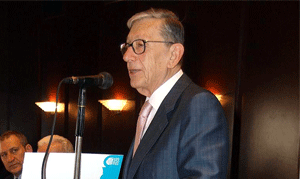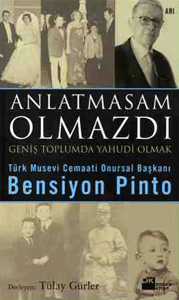To Be Jewish in a Greater Society
- Written by Admin TOA
- Published in Culture & Art

Bensiyon Pinto.
By Assistant Prof. Göknur Akçadağ* -
Honorary President of the Turkish-Jewish Community Bensiyon Pinto’s book ‘Impossible for Me Not to Tell- To Be Jewish in a Greater Society,’ in which he tells about his life, was published in September of 2008 under the editorship of Tulay Gurler.
As a person who has been a community leader, his life is full of striking events, opinions, and expositions. After serving as a community leader until 2004, he thought that passing on his memories to the new generations was the most righteous work to do, and, thus, this memoir came into existence. With certain quotations from the book, I aim to reflect on the valuable information from Pinto’s life that sheds light on Turkey, Turks, and the situation of Jewish society in Turkey. Loving Turkey as much as Turks and making efforts to introduce Turkey, B. Pinto tells in his memories that they were, as he mentioned in each platform, different in Turkey only as a religious minority and, aside from this, Jews were adapted to living as Turkish citizens in the greater society and the society also imbibed the Jews.
THE HABIT OF ASKING FOR IDENTITY
“We would not really understand that we were minority. The synagogue was under our nose. Everyone was an acquaintance. Probably because we lived in a small circle of people, both side by side with our fellow coreligionists and also in brotherhood with the other religious minority groups within the greater society, we did not think much about our identity. And nobody would make us think about it. Everyone was living so interconnected that we would not know or distinguish which holiday was Moris’s, which was Yorgo’s or Mustafa’s. A holiday was just a ‘holy day’ as its name says. Some holidays would pass with painted eggs, some with handkerchiefs filled with candy, and others with matzo. We would each get our share from all. Asking about their differences would not even occur to us. We were so used to living all together that we could not even imagine a town where we were not together. Nowadays, as soon as people hear of a different name, they automatically ask about the person’s religion. There was no habit of this sort back then. Maybe that is why that question sounds so absurd to me. It is really difficult for me to understand why there is such sensitivity in contemporary Turkey. In Europe or America, nobody asks others about their religion or nationality, because one’s faith is no one’s concern except for the person. And, religion is also a concealed value. When I pray, I don’t announce it to the world; I do not say, ‘listen oh the people, I’m praying!’ My assistant draws back to somewhere and prays (Namaz), and no one is informed. Worship is a very personal thing. You cannot give an explanation for it to anyone. It’s not only the Muslims in Turkey that ask this question but also the Greeks, Jews, and the Armenians who ask as well. The people of this land have made a habit of asking this question recently.”

TO BE JEWISH IN THE GREATER SOCIETY
“I am someone who opposed the term ‘minority’ in Turkey and worded this out in various platforms as it was fitting. We are a religious minority. There is a very important and big different between ‘minority’ and ‘religious minority.’ I prefer referring to the group which is outside of the Jewish community and which is the Muslim group making up 99% of country’s population as the ‘Greater Society,’ and I have always tried to ensure that my community instilled it as well. A person has to follow up with the circumstances of his/her time and place and how they change and where they lead. The Jewish community learned how to do that very late. During the Ottomans, the religious minorities were in the lead with monetary guilds. They were a little more Western. They were enabling multiculturalism to live in the Empire and they were following up with foreign literature. Jewish doctors that came from Germany in the 1930’s are the best examples of this. Fortunately, we achieved change. These characteristics were also preferable for the greater society. Being a Jewish or Muslim Turk began to not matter as a priority. One of the main reasons for this was because the greater society adapted to embracing Jews and they never felt discomfort from it. To integrate with a society does not mean to lose one’s religion. Integration means to love and learn to live with the greater society. A person that protects his/her traditional customs also protects his/her identity. It is difficult to find a society like Turkish society. So long as the greater society was not incited, they did not take sides.”
“My life is a story. This story was written in this country. If it weren’t for this country, I would not have anything to tell the youth of tomorrow. There wouldn’t have been correct punctuation in the correct spots within these memories. There is no other Turkey. There is one way we cannot renounce: communication. We must live by understanding the reality and value of the word ‘Turk’ in the title of ‘Turkish-Jewish Community.’ When we quit mixing up religious identity with citizen identity, then we can say we are modern.”
* SUNY- Binghamton University- Fernand Braudel Center former scholar, Yıldız Technical Uni., Department of Humanities and Social Sciences-İstanbul / İnonu Uni. Department of History, Turkey
THE HABIT OF ASKING FOR IDENTITY
“We would not really understand that we were minority. The synagogue was under our nose. Everyone was an acquaintance. Probably because we lived in a small circle of people, both side by side with our fellow coreligionists and also in brotherhood with the other religious minority groups within the greater society, we did not think much about our identity. And nobody would make us think about it. Everyone was living so interconnected that we would not know or distinguish which holiday was Moris’s, which was Yorgo’s or Mustafa’s. A holiday was just a ‘holy day’ as its name says. Some holidays would pass with painted eggs, some with handkerchiefs filled with candy, and others with matzo. We would each get our share from all. Asking about their differences would not even occur to us. We were so used to living all together that we could not even imagine a town where we were not together. Nowadays, as soon as people hear of a different name, they automatically ask about the person’s religion. There was no habit of this sort back then. Maybe that is why that question sounds so absurd to me. It is really difficult for me to understand why there is such sensitivity in contemporary Turkey. In Europe or America, nobody asks others about their religion or nationality, because one’s faith is no one’s concern except for the person. And, religion is also a concealed value. When I pray, I don’t announce it to the world; I do not say, ‘listen oh the people, I’m praying!’ My assistant draws back to somewhere and prays (Namaz), and no one is informed. Worship is a very personal thing. You cannot give an explanation for it to anyone. It’s not only the Muslims in Turkey that ask this question but also the Greeks, Jews, and the Armenians who ask as well. The people of this land have made a habit of asking this question recently.”

TO BE JEWISH IN THE GREATER SOCIETY
“I am someone who opposed the term ‘minority’ in Turkey and worded this out in various platforms as it was fitting. We are a religious minority. There is a very important and big different between ‘minority’ and ‘religious minority.’ I prefer referring to the group which is outside of the Jewish community and which is the Muslim group making up 99% of country’s population as the ‘Greater Society,’ and I have always tried to ensure that my community instilled it as well. A person has to follow up with the circumstances of his/her time and place and how they change and where they lead. The Jewish community learned how to do that very late. During the Ottomans, the religious minorities were in the lead with monetary guilds. They were a little more Western. They were enabling multiculturalism to live in the Empire and they were following up with foreign literature. Jewish doctors that came from Germany in the 1930’s are the best examples of this. Fortunately, we achieved change. These characteristics were also preferable for the greater society. Being a Jewish or Muslim Turk began to not matter as a priority. One of the main reasons for this was because the greater society adapted to embracing Jews and they never felt discomfort from it. To integrate with a society does not mean to lose one’s religion. Integration means to love and learn to live with the greater society. A person that protects his/her traditional customs also protects his/her identity. It is difficult to find a society like Turkish society. So long as the greater society was not incited, they did not take sides.”
“My life is a story. This story was written in this country. If it weren’t for this country, I would not have anything to tell the youth of tomorrow. There wouldn’t have been correct punctuation in the correct spots within these memories. There is no other Turkey. There is one way we cannot renounce: communication. We must live by understanding the reality and value of the word ‘Turk’ in the title of ‘Turkish-Jewish Community.’ When we quit mixing up religious identity with citizen identity, then we can say we are modern.”
* SUNY- Binghamton University- Fernand Braudel Center former scholar, Yıldız Technical Uni., Department of Humanities and Social Sciences-İstanbul / İnonu Uni. Department of History, Turkey
Last modified onSaturday, 06 May 2017 10:07
Tagged under
Latest from Admin TOA
- Retrial Ordered in Fraud Case Against Turkish-American Businessman Yalçın Ayaslı
- From a Bag Stand in Connecticut to a 40,000 Square Foot Warehouse in New Jersey: Ali Dayı's Entrepreneurial Journey
- Hiram & Solomon Cigars Introduces the Patriot Cigar Honoring M.W. George F. Hamilton, 91st Grand Master of Masons in Massachusetts
- PCA Officially Announces 2025 Trade Show Dates
- Galaxy Group Gets DO&CO Detroit Project
